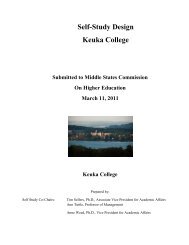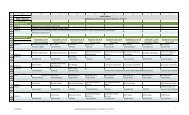final version of the self-study document - Keuka College's Middle ...
final version of the self-study document - Keuka College's Middle ...
final version of the self-study document - Keuka College's Middle ...
You also want an ePaper? Increase the reach of your titles
YUMPU automatically turns print PDFs into web optimized ePapers that Google loves.
Article I: The duties <strong>of</strong> <strong>the</strong> Faculty<br />
Article VII: The Presidential obligations with respect to <strong>the</strong> Faculty and <strong>the</strong> Board <strong>of</strong><br />
Trustees. This article also empowers <strong>the</strong> Faculty Liaison Committee to act if <strong>the</strong><br />
President fails to carry out his duties as specified in this article.<br />
The Bylaws <strong>of</strong> <strong>the</strong> <strong>Keuka</strong> College Faculty:<br />
Article I: Establishes <strong>the</strong> six Standing Committees <strong>of</strong> <strong>the</strong> Faculty<br />
Article II-VII: Identifies <strong>the</strong> responsibilities <strong>of</strong> each <strong>of</strong> <strong>the</strong> Standing Committees<br />
To ensure that <strong>Keuka</strong>’s faculty members are <strong>the</strong> most qualified personnel available, <strong>the</strong><br />
Pr<strong>of</strong>essional Standards Committee (PSC) plays a vital role from <strong>the</strong> hiring process through to reappointment,<br />
tenure and promotion. The full purpose, composition, and responsibilities <strong>of</strong> <strong>the</strong><br />
PSC are located in <strong>the</strong> Faculty Handbook, as is <strong>the</strong> evaluation, promotion, and tenure review<br />
process <strong>of</strong> all faculty members. The Faculty Personnel Policies section <strong>of</strong> <strong>the</strong> Faculty Handbook<br />
includes a full description <strong>of</strong> <strong>the</strong> evaluation process including timetable, criteria, and evaluation<br />
procedure. As indicated under <strong>the</strong> evaluation criteria, <strong>the</strong>re are (4) categories for all evaluations<br />
which include classroom instruction, non-classroom instruction, pr<strong>of</strong>essional development, and<br />
institution/community service. Additionally, <strong>the</strong> College has an established post-tenure review<br />
process, also outlined in <strong>the</strong> Faculty Handbook.<br />
Faculty members also serve on ad hoc committees created to address specific issues at <strong>the</strong><br />
College that are beyond <strong>the</strong> scope <strong>of</strong> <strong>the</strong> standing committees. Members <strong>of</strong> <strong>the</strong> Faculty are asked<br />
to volunteer, and nominations are voted upon using <strong>the</strong> same method as <strong>the</strong> standing committees.<br />
Some examples <strong>of</strong> <strong>the</strong>se ad hoc committees include: First Year Experience Task Force, Diversity<br />
Task Force, IT-Advisory Committee, Web Committee, Graduate Outcomes Task Force, and <strong>the</strong><br />
<strong>Middle</strong> States Steering Committee. President Díaz-Herrera also implemented a Long Range<br />
Strategic Planning Steering Committee, and faculty served on each <strong>of</strong> <strong>the</strong> six task forces which<br />
reported <strong>the</strong>ir findings and recommendations to <strong>the</strong> LRSP Steering Committee at <strong>the</strong> conclusion<br />
<strong>of</strong> <strong>the</strong>ir work in Spring 2012: <strong>the</strong> Task Force on Academic Program Prioritization, <strong>the</strong> Task<br />
Force on Administrative Services Review, <strong>the</strong> Task Force on Revitalizing <strong>the</strong> Curriculum, <strong>the</strong><br />
Task Force on External Environmental Analysis, <strong>the</strong> Task Force on Academic Support Services,<br />
and <strong>the</strong> Task Force on Revisiting <strong>the</strong> Mission/Vision.<br />
As recommendations were developed and forwarded to <strong>the</strong> Long Range Strategic Planning<br />
Steering Committee for consideration, <strong>the</strong> Taskforces were mindful <strong>of</strong> <strong>the</strong> need to operate within<br />
existing governance structures. For example, proposals to transform general education will be<br />
explored and developed by a working group, with oversight <strong>of</strong> <strong>the</strong> faculty Curriculum<br />
Committee. Such oversight is necessary to ensure that those with a vested interest in <strong>the</strong> learning<br />
outcomes <strong>of</strong> <strong>the</strong> curriculum are involved in developing, articulating, and assessing <strong>the</strong>m.<br />
Recommendations that address faculty workload, pr<strong>of</strong>essional development, and scholarship<br />
come under <strong>the</strong> purview <strong>of</strong> <strong>the</strong> Faculty Liaison Committee, <strong>the</strong> Faculty Development Committee,<br />
and <strong>the</strong> Pr<strong>of</strong>essional Standards Committee.<br />
These committees, working groups, and task forces have added to <strong>the</strong> diversity <strong>of</strong> ways that <strong>the</strong><br />
members <strong>of</strong> <strong>the</strong> Faculty have contributed to <strong>the</strong> policy setting, restructuring, and governance <strong>of</strong><br />
<strong>the</strong> College.<br />
Page 14 <strong>of</strong> 19 Chapter 3: Leadership, Gov. & Admin.




